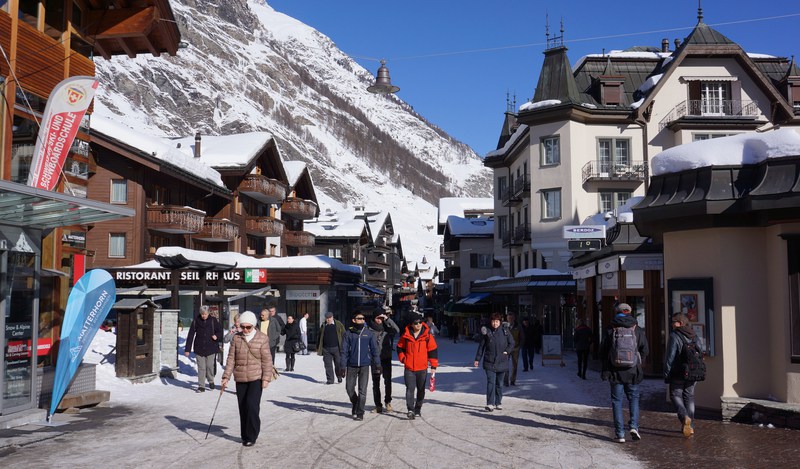The promise of snow across the Alps this weekend won’t be enough to lift the gloom at some of Europe’s top ski resorts as the pound’s post-Brexit slide dents British bookings.
Jon Fricker, a property developer in Beaconsfield, west of London, said some of his friends would probably back out of their annual piste reunion if the cost of a long weekend in the Portes du Soleil ski area straddling the border between France and Switzerland climbs much above 500 pounds ($623).
“Brexit has focused the mind,” according to Fricker, who also usually skis for a week in the same area with his wife and two teenage children. “It’s the same whether buying a house or booking a ski holiday: do we really want to spend all that money now?”
Chalets in Alpine resorts from Chamonix to Zermatt are reporting a drop in British bookings for the winter season after the pound slid more than 15 percent against the euro and the Swiss franc since the U.K. voted to leave the European Union on June 23. As reports last week showed U.K. consumer confidence ebbing as spending power weakens and inflation looms, there is a risk skiing will revert to being a pursuit of the affluent.
U.K. ski tour operator Mark Warner Holidays said Christmas bookings are down more than 10 percent at its 12 Austrian, French and Swiss destinations, while Switzerland Tourism expects overnight stays by British visitors to drop 5 percent this season.
Feeling Pinch
The weaker currency is compounding poor December snowfall over the past two years, according to Ben Roseveare, head of sales and marketing at Mark Warner. While Mark Warner and other tour operators locked in package-holiday prices before the Brexit vote, that won’t shield British skiers from the higher cost of everything from lift passes and equipment hire to a piste-side hot chocolate.
“All of a sudden you’re looking at close to a thousand pounds for a family for passes and equipment for the week and that’s a lot,” said Roseveare. “It’s all quite tricky.”
Even luxury Swiss ski operators are feeling the pinch.
“Those families clubbing together to spend 25,000 to 30,000 pounds for a ski break, they are spending less and waiting longer before booking,” said Oliver Corkhill, who heads up U.K. sales at St. Moritz-based Leo Trippi.
Outside the French resort of Chamonix, BlackRock Ski Lodge has focused on other nationalities as British visitors declined after the June vote. “When Brexit hit and we saw the impact on the currency we redirected our marketing efforts to specifically target the U.S. and France,” said co-owner Liz Mercer. “We are down on U.K. bookings but we’ve pushed other markets.”
Matterhorn Appeal
The weaker pound is also chipping away at the allure of Zermatt, ranked Europe’s third-best ski resort last year by Conde Nast Traveler readers, behind Austria’s Lech and St. Anton.
“We do seem to have a lot less U.K. people on the books this season,” said Will Southwell, who rents out his century-old wooden chalet overlooking the Matterhorn for as much as 8,360 francs ($8,600) a week during peak season. “We get most bookings in September and October, so Brexit has had an impact.”
Zermatt hopes its premium offering and the loyalty of British skiers, dating back to 1865 when Edward Whymper made the first ascent of the Matterhorn with a Swiss guide, will provide a currency buffer. U.K. visitors fell 4.3 percent last year after the franc strengthened about 20 percent against the pound following the Swiss central bank’s decision to scrap its currency cap with the euro. The British rank third behind locals and Germans in Zermatt, accounting for 7.1 percent of all visitors last year.
Love Story
“There is a long love story between the Brits and Zermatt,” said Edith Zweifel at the tourist office in the resort, where pistes climb as high as 12,739 feet (3,883 meters). “Overnight stays at 5-star hotels don’t decline because of currency changes.”
That’s the experience of The Omnia, where the British and Americans are the main customers after Swiss locals for rooms starting at 700 francs a night over Christmas and New Year.
“There has been no impact on our regular customer base,” said Philippe Clarinval, managing director of The Omnia, adding that his hotel’s appeal to wealthier skiers provides a buffer. “Perhaps hotels in the 3 and 4-star bracket will be affected.”
Zermatt hopes to increase its appeal to British skiers with Swiss International Air Lines offering new half-term flights from London to Sion, 50 miles by road from the resort. For another 400 francs, skiers can connect directly from Sion airport to Zermatt by helicopter.
Scottish Dividend
A spokeswoman for Swiss International said demand for flights between the U.K. and the Alps hasn’t changed “significantly” since the Brexit vote. EasyJet Plc, which has its biggest hub outside the U.K. in Geneva, said the “exchange rate may have an impact,” but it’s too early for a full assessment.
That’s also the conclusion of Crystal Ski Holidays, which only expects the weaker pound to show through the following winter season. The U.K.’s biggest ski operator said the number of British skiers has dropped about 25 percent from a 2007 peak to roughly 900,000, generating at least 1 billion pounds before spending on food, drink and other items in resorts.
One beneficiary of the weaker pound may be Scottish ski resorts, where pistes reach about 1,200 meters, less than a third of the height of runs in Zermatt.
While unpredictable snowfall means bookings and lift demand tend to be last-minute, Ross Coulter, a spokesman for Cairngorm Mountain, is optimistic about a Brexit dividend.
“We would certainly be expecting this to have a big impact in terms of domestic visitors, as it could be the difference between a family being able to afford a ski holiday or not,” he said.
Full story here Are you the author? Previous post See more for Next post
Tags: newslettersent

































